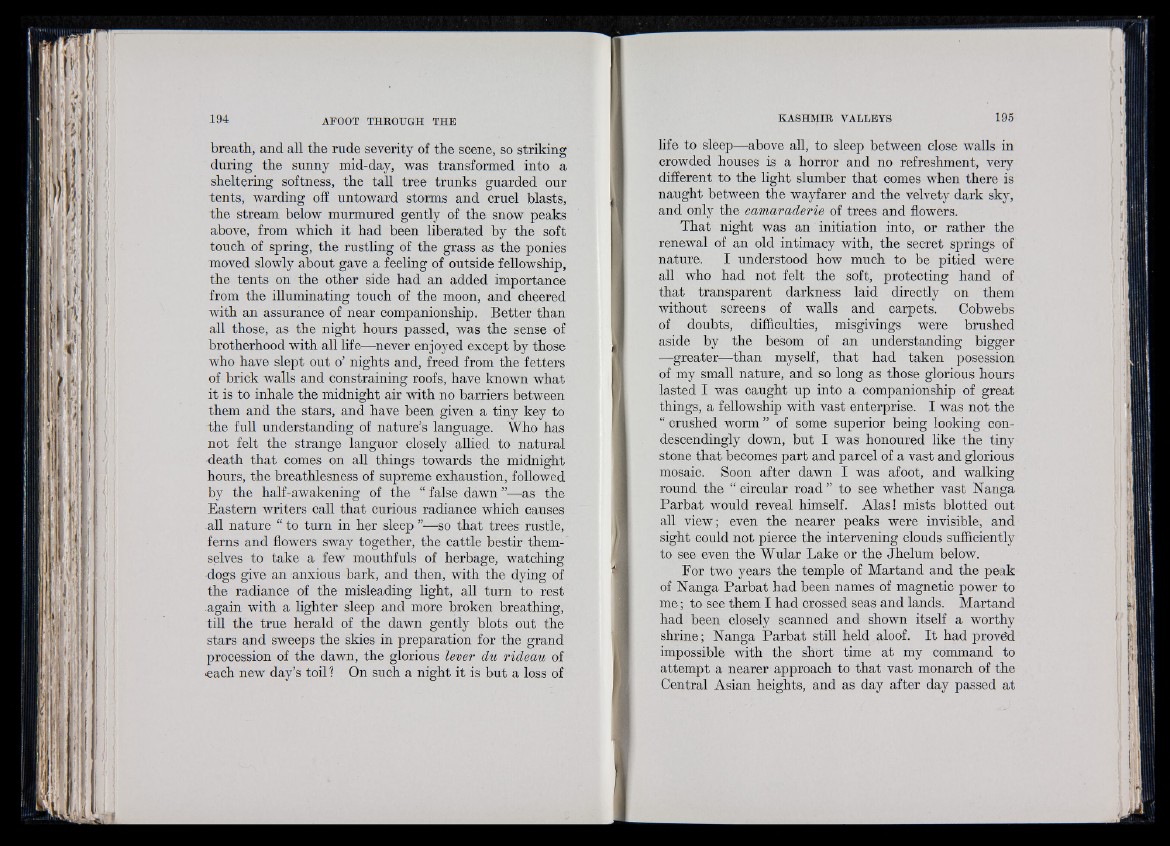
breath, and all the rude severity of the scene, so striking
during the sunny mid-day, was transformed into a
sheltering softness, the tall tree trunks guarded our
tents, warding off untoward storms and cruel blasts,
the stream below murmured gently of the snow peaks
above, from which it had been liberated by the soft
touch of spring, the rustling of the grass as the ponies
moved slowly about gave a feeling of outside fellowship,
the tents on the other side had an added importance
from the illuminating touch of the moon, and cheered
with an assurance of near companionship. Better than
all those, as the night hours passed, was the sense of
brotherhood with all life—never enjoyed except by those
who have slept out o’ nights and, freed from the fetters
of brick walls and constraining roofs, have known what
it is to inhale the midnight air with no barriers between
them and the stars, and have been given a tiny key to
the full understanding of nature’s language. Who ba.q
not felt the strange languor closely allied to natural
death that comes on all things towards the midnight
hours, the breathlesness of supreme exhaustion, followed
by the half-awakening of the “ false dawn ”—as the
Eastern writers call that curious radiance which causes
all nature “ to turn in her sleep ”—so that trees' rustle,
ferns and flowers sway together, the cattle bestir themselves
to take a few mouthfuls of herbage, watching
dogs give an anxious bark, and then, with the dying of
the radiance of the misleading light, all turn to rest
again with a lighter sleep and more broken breathing,
till the true herald of the dawn gently blots out the
stars and sweeps the skies in preparation for the grand
procession of the dawn, the glorious lever du rideau of
■each new day’s toil? On such a night it is but a loss of
life to sleep—above all, to sleep between close walls in
crowded houses is a horror and no refreshment, very
different to the light slumber that comes when there is
naught between the wayfarer and the velvety dark sky,
and only the camaraderie of trees and flowers.
That night was an initiation into, or rather the
renewal of an old intimacy with, the secret springs of
nature. I understood how much to be pitied were
all who had not felt the soft, protecting hand of
that transparent darkness laid directly on them
without screens of walls and carpets. Cobwebs
of doubts, difficulties, misgivings were brushed
aside by the besom of an understanding bigger
—greater—than myself, that had taken posession
of my small nature, and so long as those glorious hours
lasted I was caught up into a companionship of great
things, a fellowship with vast enterprise. I was not the
“ crushed worm ” of some superior being looking condescendingly
down, but I was honoured like the tiny
stone that becomes part and parcel of a vast and glorious
mosaic. Soon after dawn I was afoot, and walking
round the “ circular road ” to see whether vast Nanga
Parbat would reveal himself. Alas! mists blotted out
all view; even the nearer peaks were invisible, and
sight could not pierce the intervening clouds sufficiently
to see even the Wular Lake or the Jhelum below.
Por two years the temple of Martand and the peak
of Nanga Parbat had been names of magnetic power to
me; to see them I had crossed seas and lands. Martand
had been closely scanned and shown itself a worthy
shrine; Nanga Parbat still held aloof. I t had proved
impossible with the short time at my command to
attempt a nearer approach to that vast monarch of the
Central Asian heights, and as day after day passed at